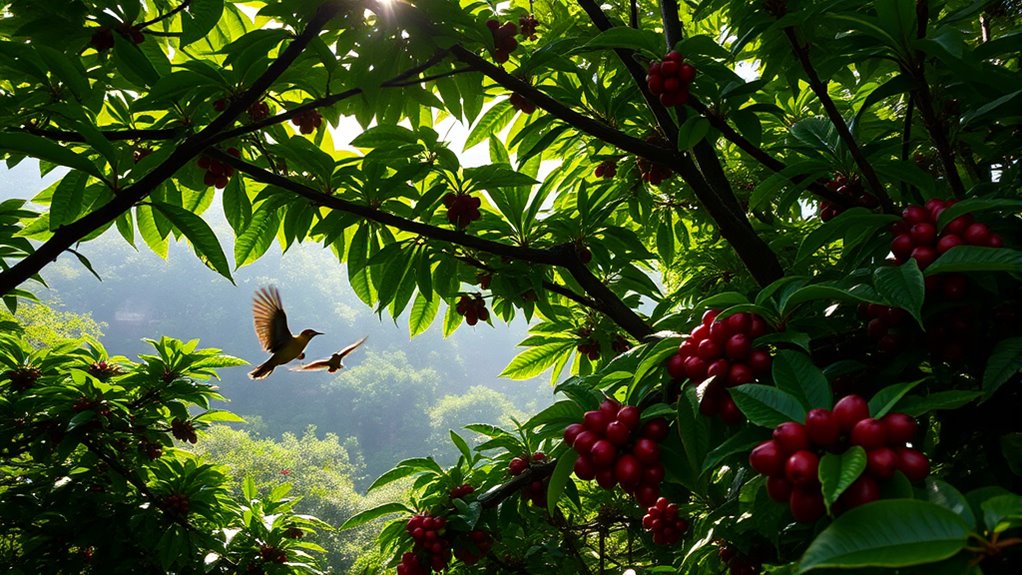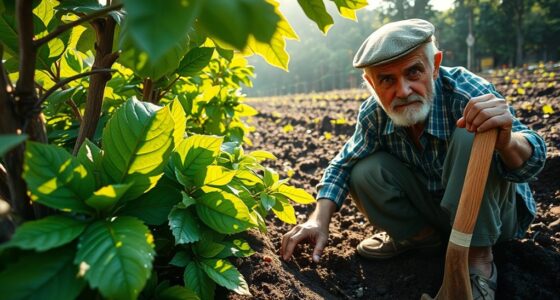Shade-grown coffee is essential for promoting ecological sustainability and enhancing flavor. It boosts biodiversity, providing habitats for various species and improving soil health. This method slows coffee cherry ripening, leading to richer flavors and lower acidity. Economically, it offers farmers premium prices and diversified income, helping them adapt to climate change. By choosing shade-grown coffee, you support a healthier planet and better farming practices. You’ll discover even more compelling benefits that come with this sustainable choice.
Key Takeaways
- Shade-grown coffee enhances biodiversity, providing habitats for various species and supporting ecological balance.
- It promotes soil health, reducing erosion and improving carbon sequestration capabilities.
- The slower maturation process under shade results in complex flavors and lower acidity, appealing to specialty coffee consumers.
- Economic benefits include premium pricing and diversified income streams for farmers, ensuring sustainability and stability.
- Sustainable practices in shade-grown coffee align with environmental efforts, reducing deforestation and promoting responsible agricultural methods.
What Is Shade-Grown Coffee?
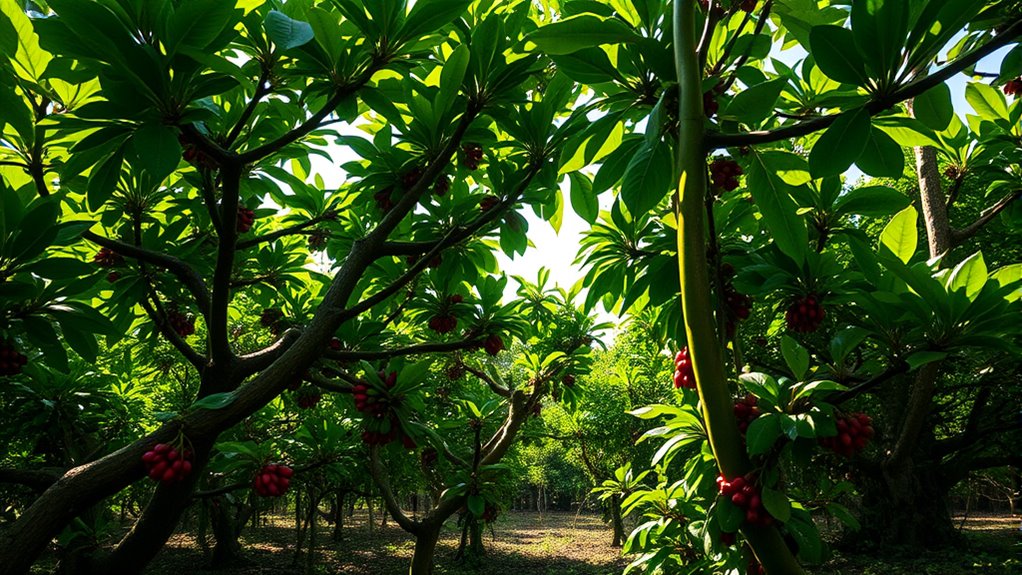
Shade-grown coffee, which is cultivated beneath a canopy of taller trees, offers a unique approach to coffee farming that benefits both the environment and your cup.
This method relies on sustainable practices that enhance biodiversity by creating a natural habitat for various flora and fauna. Unlike sun-grown coffee, shade-grown coffee reduces soil erosion and promotes carbon sequestration, making it a more eco-friendly choice.
Coffee farmers utilizing this technique often see improved coffee production due to the natural pest control and pollination provided by the diverse ecosystem.
Additionally, the slower maturation of coffee cherries in shaded areas results in beans with complex flavors and lower acidity, ensuring a richer taste in every sip.
Benefits of Shade-grown Coffee
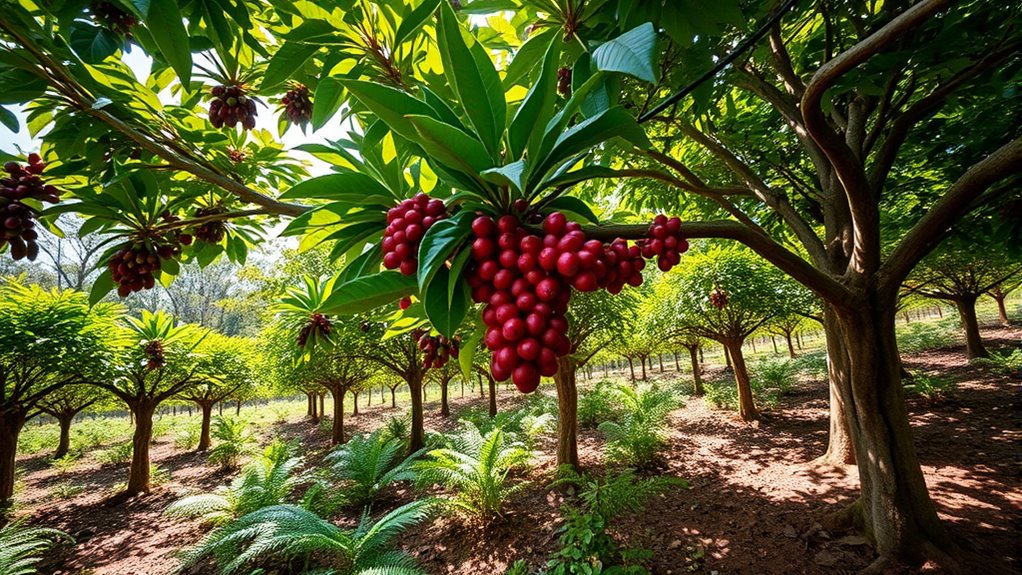
When you choose shade-grown coffee, you’re not just enjoying a richer flavor; you’re also supporting environmental sustainability.
The slower maturation under tree canopies enhances the coffee’s natural sugars, leading to a complex taste profile.
Plus, these farms promote biodiversity and soil conservation, making a positive impact on local ecosystems.
Environmental Sustainability Impact
By choosing shade-grown coffee, you’re not just enjoying a delicious brew; you’re also supporting a farming method that greatly boosts environmental sustainability.
Shade-grown coffee is an environmentally friendly option that enhances biodiversity by providing habitats for a greater variety of bird species. These farms experience markedly less soil erosion, promoting healthier soil and stability.
The trees in shade-grown systems aid in carbon sequestration, potentially capturing an additional 1.6 billion tons of carbon if more farms switch to this method. Additionally, these systems improve water retention and reduce runoff, minimizing the need for irrigation. Furthermore, the practice of shade-growing can also lead to enhanced soil health, which supports overall ecosystem resilience.
Enhanced Flavor Profile
Choosing shade-grown coffee not only benefits the environment but also elevates your coffee experience with a richer flavor profile.
The slower ripening process under tree canopies allows coffee beans to develop complex natural sugars, resulting in enhanced flavor profiles that you can truly savor. This unique growing environment, characterized by lower temperatures and increased humidity, helps preserve the delicate nuances of each cup, making shade-grown coffee a favorite in the specialty coffee market.
Additionally, the diverse ecosystem enriches the beans with nutrients from surrounding plants, contributing to a superior taste.
With lower caffeine content and acidity, you can enjoy your coffee without the jitters, making it a gentler choice for your stomach.
Ecological Advantages of Shade-grown Coffee
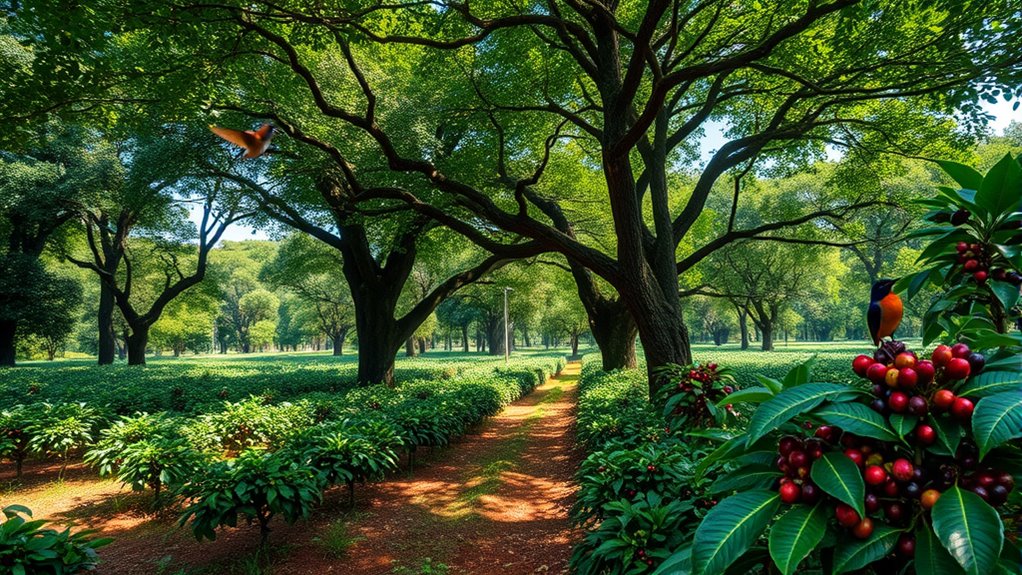
While many coffee lovers mightn’t realize it, shade-grown coffee farms offer significant ecological advantages that extend beyond just a better cup of coffee.
These farms boost biodiversity, supporting 30% greater bird abundance and 15% more bird diversity than sun-grown systems. By fostering complex agro-ecosystems, shade-grown coffee enhances habitats for natural predators, which aids in pest control and reduces the need for chemical pesticides. Additionally, these systems contribute to environmental innovations that promote sustainable agricultural practices, particularly through the use of renewable resources that align with eco-friendly farming techniques. Furthermore, the tea industry has also seen a shift towards sustainable production methods, highlighting a growing consumer demand for ethically sourced products. Research indicates that these sustainable practices can also lead to increased fiber content in crops grown alongside shade trees, enhancing overall soil health.
Shade-grown coffee farms significantly enhance biodiversity, supporting more birds and fostering natural habitats that promote eco-friendly pest control.
Moreover, shade trees play an important role in soil conservation by limiting erosion and increasing soil carbon content by 18%. They also improve water retention, stabilizing slopes and enhancing local water supplies. Moreover, supporting shade-grown coffee aligns with sustainable eating habits, which contribute positively to the environment.
In short, choosing shade-grown coffee means supporting sustainable coffee farming practices that benefit both the environment and the wildlife that inhabits it.
Flavor Profile Enhancement in Shade-grown Coffee
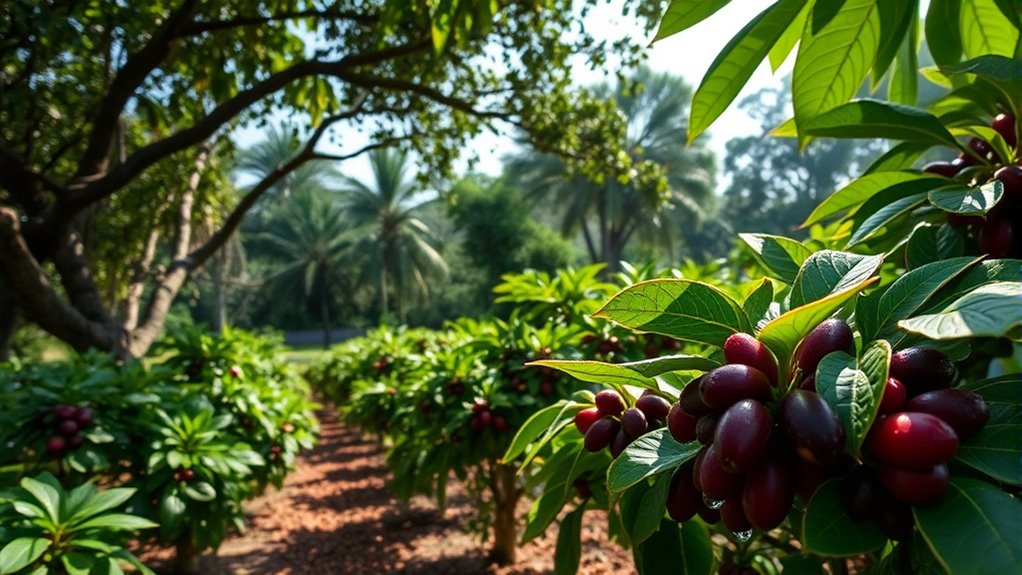
Shade-grown coffee not only supports ecological balance but also enhances the flavor profile of your favorite brew.
The slower ripening process in shaded environments allows coffee beans to develop natural sugars, resulting in a sweeter, more aromatic coffee. Cooler temperatures contribute to lower acidity levels, giving you a smoother taste that’s gentler on your stomach compared to sun-grown varieties.
Plus, the surrounding plants enrich the soil, improving the overall quality of the coffee beans and leading to a richer flavor experience. This unique combination of factors makes shade-grown coffee not just a sustainable choice, but a delicious one, offering you a delightful cup with every sip. Additionally, shade-grown coffee practices can contribute to kidney stone prevention while promoting overall health through its environmental benefits.
Experience the difference and savor the complexity of shade-grown coffee.
Economic Impact on Farmers
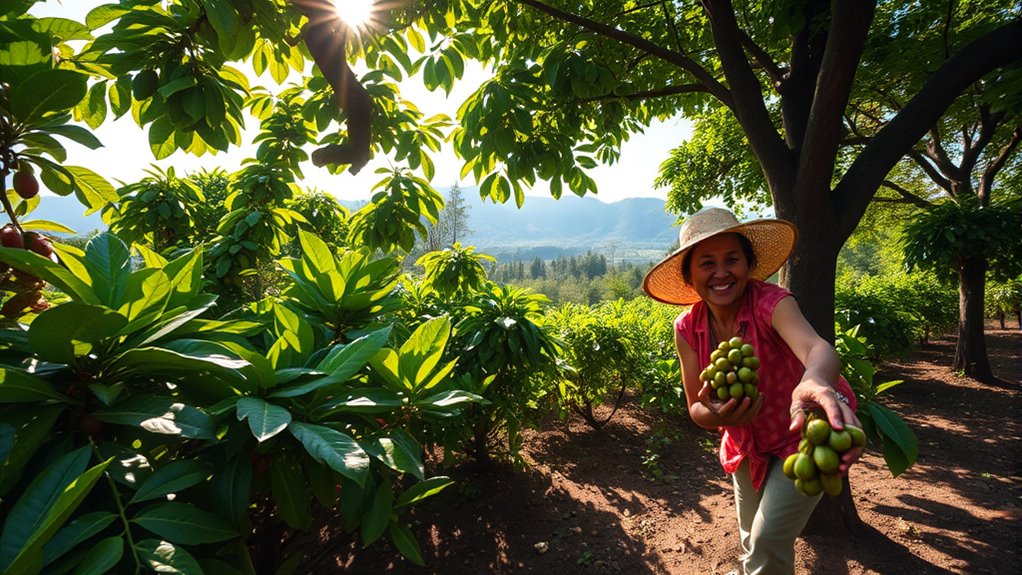
Many farmers find that shade-grown coffee offers significant economic advantages. By cultivating shade-grown coffee, you can achieve a price premium due to the high-quality beans produced in shaded environments. This method not only enhances your income but also encourages diversified income streams from non-coffee products like fruits and firewood.
Here’s a quick overview of the economic impacts:
| Benefits | Shade-Grown Coffee | Conventional Coffee |
|---|---|---|
| Price Premium | Higher due to quality | Lower |
| Diversified Income | Fruits, firewood | Primarily coffee |
| Deforestation Risk | Lower with certified farms | Higher |
The Future of Shade-grown Coffee and Sustainability
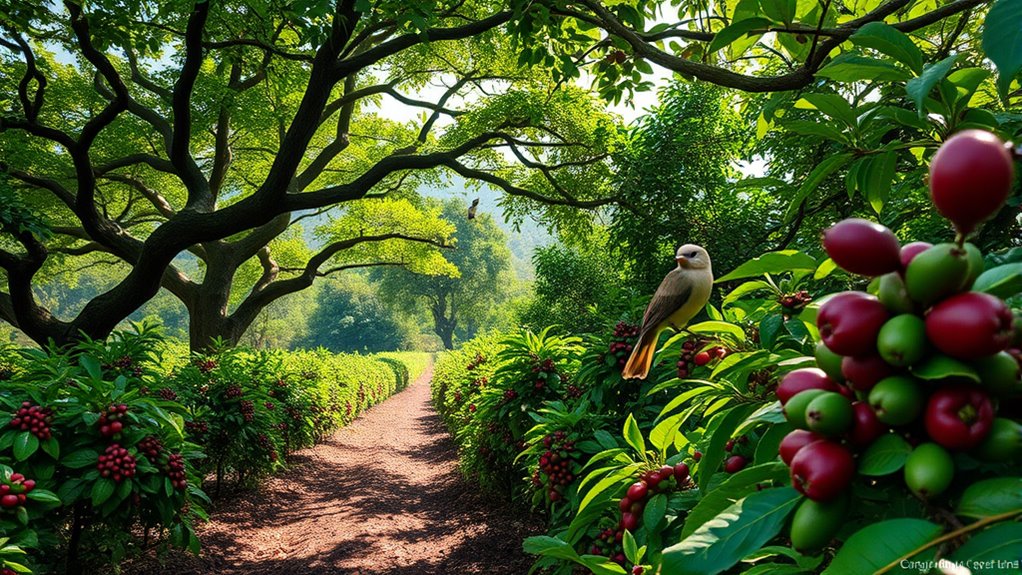
As consumers increasingly seek sustainable options, the future of shade-grown coffee looks promising. This method not only supports coffee producers in adapting to climate change but also enhances biodiversity by creating essential bird habitats.
Shade-grown coffee farms, covering over 37,000 acres, offer ecological benefits like reducing soil erosion by up to 2.5 times compared to sun-grown systems. They also play a significant role in carbon sequestration, with the potential to absorb an additional 1.6 billion tons of carbon.
Furthermore, shifting to shade-grown practices can lead to higher quality beans, allowing farmers to command price premiums. As awareness of these advantages grows, shade-grown coffee stands as a sustainable choice for both the environment and farmers’ economic futures.
Frequently Asked Questions
Why Is Shade-Grown Coffee Important?
Shade-grown coffee’s important because it supports biodiversity, providing habitat for numerous bird species and promoting ecological balance.
By enhancing soil health and reducing erosion, it contributes to sustainable agriculture. This method also helps mitigate climate change by acting as a carbon sink, sequestering significant amounts of carbon.
Additionally, it minimizes the need for harmful chemicals, protecting local water supplies and fostering healthier ecosystems, making your coffee choice impactful for the environment.
Why Is Shade-Grown Coffee Better for Birds?
Think of shade-grown coffee farms as a bustling avian café. Here, you’ll find diverse habitats that attract up to 180 bird species, creating a vibrant ecosystem.
Because these shaded areas mimic natural forests, you’ll notice 30% more birds and 15% greater diversity compared to sun-grown farms. The trees provide shelter and nesting sites, allowing migratory birds to thrive while also helping control pests, ultimately benefiting both the birds and your coffee crop.
What Are the Benefits of Shade-Grown Coffee and Cocoa Compared to That Grown in Full Sun?
Shade-grown coffee and cocoa offer numerous benefits compared to sun-grown varieties.
You’ll notice better biodiversity, as these systems support more bird species and other wildlife. They also prevent soil erosion, maintaining healthier soil.
The slower maturation process results in richer flavors and lower acidity, producing higher quality beans.
Plus, natural pest control from the canopy reduces the need for chemicals, and these farms sequester more carbon, helping combat climate change.
Why Is Some Coffee Grown in Full Sun but Not in the Shade?
Imagine a bright sunlit field, where coffee plants stretch toward the sky, soaking up every ray.
Some farmers grow coffee in full sun because it maximizes their yields, thanks to sun-tolerant varieties.
While the allure of higher production is tempting, it often comes at the cost of clearing trees, harming local ecosystems.
You might find that in certain regions, sun exposure enhances growth, balancing the pros and cons of sun versus shade cultivation.
Conclusion
To sum up, shade-grown coffee isn’t just a delicious choice; it’s an essential part of sustainable agriculture. By promoting biodiversity, it supports over 150 species of birds and helps reduce deforestation. With over 50% of the world’s coffee produced under shade, your cup can contribute to a healthier planet. Choosing shade-grown coffee means you’re not just savoring great flavors but also investing in the future of our environment and the livelihoods of farmers.
